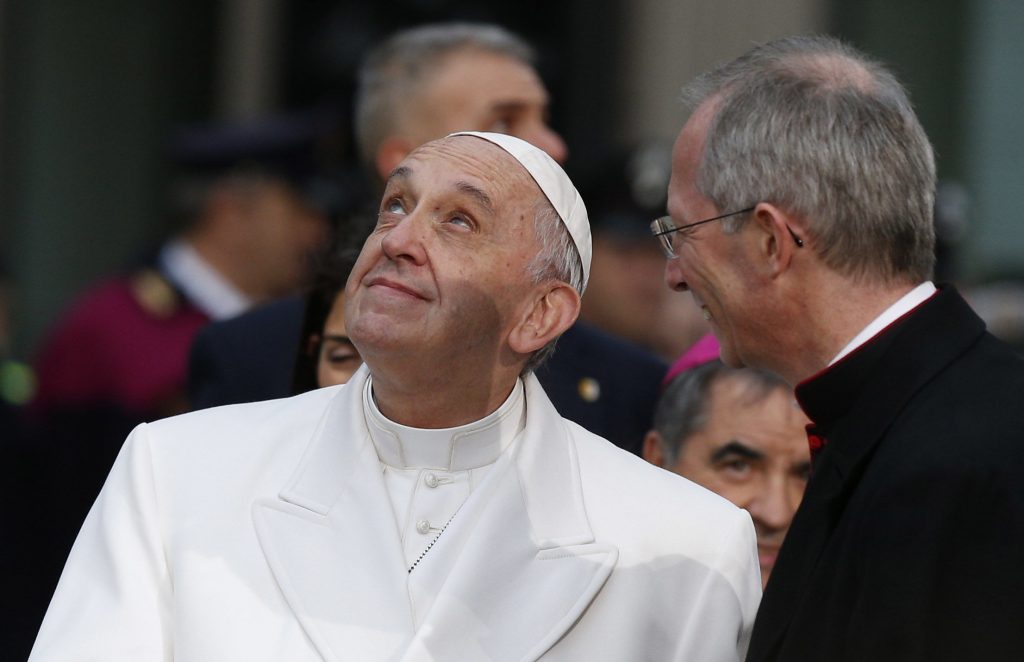“Reform” is one of those notoriously ambiguous words — in the same category with hope, change, progress and improvement — that everyone professes to support, but which no one defines in quite the same way.
Thus, the question of whether or not Pope Francis is a “Reform Pope” will depend largely on what you mean by the term.
Many observers are convinced that Pope Francis is a quintessential reformer. Austen Ivereigh, for instance, titled his biography of the pontiff “The Great Reformer.” For this group, “reform” usually functions as a placeholder for enacting what they perceive as the vision of the Second Vatican Council (1962-65), meaning a Church heavier on mercy and lighter on judgment; a Church closer to the people than to elites; a Church less beholden to conservative political forces and alignments; and a decentralized Church, less dominated by Rome.
If that’s your definition of “reform,” then Francis is almost unquestionably a reformer, and a fairly successful one to boot. From his ruling on Communion for divorced and remarried Catholics in to his decision to restore control over many matters of liturgical translation to local bishops’ conferences, it’s hard to argue he isn’t delivering on the “Vatican II” agenda.
But if your understanding of “reform” is more classical, seeing it as a reaffirmation of traditional doctrine and discipline after a period of lassitude, then Pope Francis may not profile as a “reformer” at all. Instead, you may see him as the kind of pope who’s actually creating the need for a future reform, by allowing things to go to seed.
Then there are single-issue Catholics, for whom the lone test of reform is how the pope stacks up on the thing that concerns them the most — with the consequence that whether Pope Francis is a reformer in their eyes will depend on his track record on that issue.
To take the most obvious example, many people deeply concerned with the Church’s response to its child sexual abuse scandals aren’t yet ready to call Pope Francis a historic reformer.
Yes, they’ll say, he’s said the right things, pledging support for a “zero tolerance” policy on abuse and promising a new culture of accountability for bishops and other superiors who drop the ball in implementing that policy.
Yet, they’ll also say, there are reasons why the two abuse survivors on the pope’s own anti-abuse commission both have resigned, citing internal Vatican opposition to a reform agenda.
For one thing, they say, Pope Francis appointed a bishop in Chile with a history as an apologist for that country’s most notorious abuser priest, and has stubbornly refused to reconsider the appointment even in light of strong public protest.
Moreover, Pope Francis announced a new system for investigating and prosecuting accusations of cover-up against bishops, but has yet to spell out what its procedures are going to be or to appoint anyone to implement it.
There’s also what many of the cardinals who voted for Pope Francis in March mean by “reform,” which is a cleanup of the Vatican itself, especially its legendarily scandal-plagued methods of money management.
If that’s the test, then it’s difficult so far to make the case for Pope Francis as a great reformer. He launched three new entities to oversee the overhaul in 2014: a Council for the Economy made up of cardinals and laity, to set policy; a Secretariat for the Economy, to implement it; and an independent Auditor General, to keep everyone honest.
Today, both the secretariat and the auditor’s office are basically adrift, with their leaders out of the picture for different reasons, while real power over Vatican finances has been steadily reaccumulated by the Secretariat of State — by consensus, the bastion of the “old guard.”
Many Vatican observers today are prepared to write obituaries for the reform project, while others insist the jury is still out and the pope could yet snatch victory from the jaws of defeat. Time will tell, but for right now, it seems clear that the best grade one could award Pope Francis on the financial cleanup probably is an “incomplete.”
To be honest, we may be veering dangerously close to “Captain Obvious” territory in putting it like this, but here’s the bottom line anyway: Is Pope Francis a reformer? Well, it depends on whom you ask.

